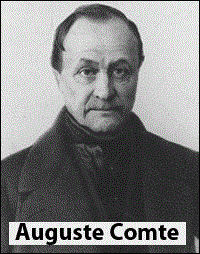Auguste Comte – Biography
Auguste Comte was a renowned French social philosopher. Through his scholastic efforts, he contributed a lot to the field of Social Sciences. He laid the foundation of sociology as a discipline for scientific study of human society and is thus known as the founder of modern Sociology. The full name of Auguste Comte was Isidore Auguste Marie François Xavier Comte.

In 1817, Comte met Henri de Saint-Simon, a social thinker who is nowadays remembered as one of the founders of socialism. Comte was deeply inspired by the ideas of Saint-Simon. He became a friend and secretary of Saint-Simon. Saint-Simon had a deep impact on the ideas of Comte which can be seen in the resemblance of ideas of Comte and Saint-Simon in their published works. Comte and Henri de Saint-Simon remained friends for a long time but in 1824, their partnership ended due to a dispute on the authorship of a joint article.
In 1822, Comte published a volume ‘Plan de Travaux Scientifiques necessaires pour reorganiser la Societe (Plan of scientific studies required to reorganize the society). In this volume, he expressed the need for the scientific study of society. Comte was born and raised in an environment where the French revolution has recently matured, and the Industrial Revolution has started blossoming. He was of the view that the modernizing society may face certain problems such as social disintegration and moral degeneration. Therefore, he believed that society must be studied in a systematic manner in order to address the problem of modernizing society and to restructure it.
In 1825, Comte married Caroline Massin in a civil wedding, however, their marital relationship had not been happy and thus ended up in separation later on.
In 1826, Comte began delivering a series of lectures on his famous work Course of Positive Philosophy, whose audience included the notable French scholars. However, this series was interrupted by Comte’s sudden mental break(cerebral crisis) due to overwork and conjugal sorrows. He was hospitalized for treatment. He had to continue his treatment by getting hospitalized periodically. In 1829, he started working again on the Course of Positive Philosophy and published its six volumes in 1830, 1835, 1838, 1839, 1841 and 1842. These volumes emphasized the scientific approach to inquiry in social sciences. Marx was of the view that like natural phenomena, social phenomena can also be studied using the scientific method to generate valid scientific knowledge. His emphasis on the scientific approach to inquiry in social sciences (in his Course of Positive Philosophy) made him earn the title founder of positivism.
From 1830 to 184, he served as a tutor and examiner at Ecole Polytechnique but due to his differences with its administrator, he was removed from his post in 1842. In the same year, he separated from his wife Caroline Massin after 17 years of their marriage.
In the following years of his life, Comte depended on his friends for his financial support. Notable among them was his close friend of John Stuart Mill who was an English philosopher.
In 1844, Comte fell in love with Clotilde de Vaux who was a French aristocrat and writer. Both had a romantic experience with one another; however, Clotilde de Vaux died the same year of tuberculosis. The death of her love-lady deeply impacted the thinking style of Comte.
In 1846, after the death of Clotilde de Vaux, Comte turned into a quasi-religious philosopher. He wrote the System of Positive Polity. He formulated his theory of religion of humanity to reflect on religiosity based on humanity, morality and reason as a basis for harmony and order in modern society.
Comte died of stomach cancer on 5 September 1857 in Paris. He was buried in the known Pere Lachaise Cemetery.
The apartment, where Comte lived from 1841 to 1857, has been conserved as the ‘Maison Auguste Comte’ meaning the Home of Auguste Comte.
THEORETICAL CONTRIBUTIONS OF AUGUSTE COMTE
The major theoretical contributions of August Comte are as follows:
- Plan of scientific studies required to reorganize the society
- The course of Positive Philosophy – Positivism
- Classifications of Sciences
- Law of Three Stages
- The Religion of Humanity




